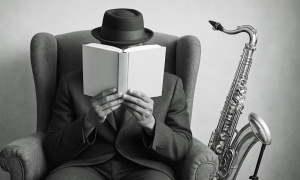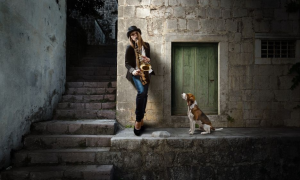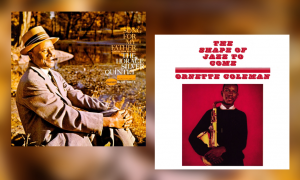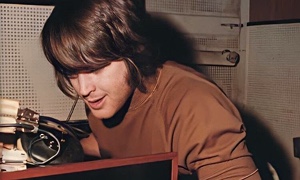Home » Jazz Articles » Building a Jazz Library » Bill Frisell As Leader: A Beginner's Guide
Bill Frisell As Leader: A Beginner's Guide

Courtesy Nedici Dragoslav
Bill Frisell's debut as leader, In Line, (ECM, 1983) was originally conceived of as a solo album—an unusual move for Manfred Eicher's label. For a number of reasons, the recording session in Oslo did not pan out exactly as planned. Frisell has stated on record that he simply wasn't ready for the occasion. To salvage the session, Eicher drafted in bassist Arild Anderson, who plays on five of the nine compositions. If the results were uneven, no such charge could be levelled against Frisell's second album, Rambler, recorded closer to his spiritual home, in the Avatar Studio, New York.
 Rambler
Rambler(ECM, 1984)
For Rambler, Frisell assembled a crack team in Kenny Wheeler, Paul Motian, Jerome Harris (on electric bass) and tuba player Bob Stewart—musicians whose strong individual personalities he embraced to good effect. Frisell is in expansive form, toggling between electric guitar and the slightly dated sounding guitar synthesizer, and dovetails brilliantly with Wheeler as though they were old soul mates—the two had in fact toured England and Wales together in 1978, in Mike Gibbs big band.
Seven originals reveal threads of an idiosyncratic style that Frisell would develop this way and that over the coming decades. Downtown New York edge rubs shoulders with country twang, marching band rhythms—a nod to Frisell's Denver youth—and that indefinable, yet instantly recognisable melodicism that draws on roots stretching far and wide.
Rhythmically too, tensions abound, with Motian's loose, intuitive invention contrasting with Harris' more linear approach and Stewart's deep, anchoring pulses. Standouts include "Rambler" and "Strange Meeting," tunes that Frisell has returned to time and again over the years.
 Have a Little Faith
Have a Little Faith(Nonesuch, 1992)
From Aaron Copland and Charles Ives to Muddy Waters, from John Philip Sousa and Stephen Collins Foster to Bob Dylan, Frisell explores the roots of his musical DNA with equal measures loving respect and mischievous stirring. Frisell regulars, drummer Joey Baron and bassist Kermit Driscoll, are joined by accordionist Guy Klucevsek and Don Byron on clarinets—an unusual grouping of instruments that would become one of Frisell's hallmarks.
You suspect that Frisell could almost have engineered the entire album from Copland's multiple-part suite "Billy the Kid." Suffice it to say, its twenty minutes provides a wonderful example of the guitarist's visionary interpretive mind. Cinematic in scope, brimming with emotional nuances, replete with humour and melodic and harmonic colors of quiet sublimity, not to mention a good dose of slightly off-beat orchestration, it is Frisell in a nutshell.
Frisell's fascination with Thelonious Monk seeps through on the boppish Sonny Rollins number "No Moe," while his treatment of 19th and 20th century traditional songs that straddle the blues, parlour music, marching bands, the Great American Songbook and the modernism of Charles Ives—another important influence—celebrates the common ground of all music. Frisell's balladry, notably on Madonna's "Live to Tell," Dylan's "Just Like a Woman" and John Hyatt's "Have a Little Faith in Me" is exquisite. An album that still charms and surprises after all these years.
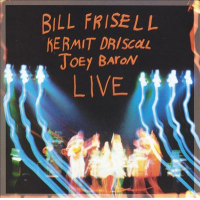 Live
Live(Gramavision, 1995)
Recorded four years earlier, at Seville's Teatro Lope de Vega, Frisell's first live album, with long-term associates, bassist Kermit Driscoll— whom the guitarist had met at Berklee in 1975—and drummer Joey Baron—is rightly revered as one of the most exciting entries in his discography.
In this trio of equals, everything and anything is on the table. Form and freedom vie in beguiling juxtaposition, where Frisell's charismatic melodies—dark and somber yet tinged with great beauty, bright and jaunty yet slightly off-kilter—lead to extended improvised passages of constantly shifting rhythms. The grungy attack of "Throughout," a surprisingly gentle rendition of "Strange Meeting" and the rock 'n' roll subtext of "When We Go" serve as reminders that Frisell never plays a tune the same way twice.
Frisell soars on the hugely enjoyable, waltz-tinged "Rag." The effects-heavy "Crumb" bleeds into "No Moe," a wild experimental ride that is light-years removed from the boppish version recorded on Have a Little Faith. Elsewhere, whip-smart improvisational dialogs are punctuated by splashes of tango, bursts of '50s rock and country, grungy explorations and more than a few atmospheric interludes where time seems to stand still. An eclectic hotchpotch? Not a bit of it. This is wholly organic, playful adventure from three equally open-minded personalities.
 Good Dog, Happy Man
Good Dog, Happy Man(Nonesuch, 1999)
In the late '90s Frisell made a trio of excellent albums for the Nonesuch label. Nashville (1997), Gone, Just Like a Train (1998) and the gem of old-meets-new Americana that is Good Dog, Happy Man. An expansive, pastoral feeling colors much of the music and with "Rain, Rain," "Roscoe"— named for Appalachian folk singer/banjoist Roscoe Holcomb—and "That Was Then" Frisell delivers some of his prettiest, most memorable tunes.
An ace band features the incredibly versatile talents of drummer Jim Keltner, bassist Viktor Krauss, organist Wayne Horvitz and Greg Leisz, the latter who lends a wonderful array of complementary textures on pedal steel, Dobro, National Steel guitar and mandolin. Ry Cooder guests on a poignant rendition of "Shenandoah," dedicated to Alabama guitarist Johnny Smith, who had been an influential teacher of Frisell in the 1970s.
Frisell shines on both acoustic and electric guitar, putting an elegantly modern spin on music that draws inspiration from old-time, country and folk, while venturing, via jam-like excursions, into territory uncharted. Much of the music is laid back, with the intertwining strings on the title track conjuring sweet, Hawaiian slack-key sonorities. There's infectious groove too, on the episodic "Cold, Cold Ground" and on the funky country romp of "Big Shoe." Spacious, melodically bright and uplifting.
 Ghost Town
Ghost Town(Nonesuch, 2000)
For his first, fully fledged solo album, Frisell makes liberal use of overdubs, entwining acoustic and electric guitar and loops to painterly affect. This me, myself and I approach throws up beautiful yet dark-hued results—a duality that is at the core of Frisell's musical aesthetic. "Variation on a Theme (Tales from the Far Side)" might be just a tad too dark for a Quentin Tarantino soundtrack, but it was the perfect fit for Gary Larson's wickedly funny animated film directed by Marv Newland.
A shimmering electric guitar backdrop and acoustic foreground characterizes highly personalised interpretations of "When I Fall in Love"—the melody played on six-string banjo—and Hank William's "I'm So Lonesome I Could Cry." There are plenty of other highlights, from a bluesy take on John McLaughlin's "Follow Your Heart " and a toe-tapping version of the 19th century folk song "Wildwood Flower"—popularized by The Carters—to an introspective steel-string reading of G. Gershwin/Heyward's melancholy aria "My Man's Gone Now."
No less arresting are the Frisell originals, "What A World," "Outlaw," "Winter Always Turns to Spring" and "Under a Golden Sky," ambient adventures all, with the guitarist's loops creating brooding, hypnotic, and curiously beautiful soundscapes. A quietly bewitching album.
 Blues Dream
Blues Dream(Nonesuch, 2001)
Not met with universal acclaim at the time, yet a favourite of many Frisell acolytes, Blues Dream marked a significant step in Frisell's ongoing synthesis of American musical vernacular. The title is apt, for the blues is a consistent though sometimes subliminal thread throughout a suite-like, cinematic adventure—the soundtrack to an imaginary road trip through America's rural and urban highways and byways.
As on Good Dog, Happy Man, Greg Leisz—on steel guitar and mandolin—forges a deep sympatico with Frisell. Key too, are Frisell's striking arrangements for trumpeter Ron Miles, alto saxophonist Billy Drewes and trombonist Curtis Fowlkes. Drummer Kenny Wollesen and bassist David Piltch, two wonderfully non-denominational musicians, infuse Frisell's compositions with rhythmic elasticity and, much like the leader, accents unconstrained by genre.
On an album of relatively little soloing, it is Frisell's compositions that take center stage. The powerfully brooding "Ron Carter," the Tom Waits-esque cowboy noir of "Outlaws" and the infectious blues-rock of "Things Will Never be The Same" all boast a loose, guitar-jam underbelly. That said, Frisell and Leisz's playing never overpowers the horns, whose rich harmonies, riffing punctuation and occasionally skewed weaves leave a lasting impression.
Frisell's adventurous explorations on Nashville perhaps emboldened him on Blues Dream to not only embrace all manner of older American folk music, but to treat it on the same level as he would jazz, the blues and his customary loops-and-pedals soundscaping. There is country gold in the chugging rhythms of the upbeat "The Tractor," but elsewhere this accent is just one of many at play.
On the delightful "Slow Waltz" there are shades of Jack Nitzsche's theme from One Flew Over the Cuckoo's Nest, while several short mood pieces defy categorisation. Blues Dream felt like a point of arrival for Frisell, but like so much in his musical trajectory, it was just another station along the trail.
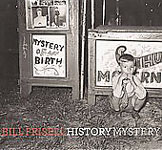 History, Mystery
History, Mystery(Nonesuch, 2008)
Frisell's originality, his unique blueprint, does not come out of thin air. It is built upon an historical appreciation of, and curiosity for all music—popular, high-brow and experimental—that has gone before. The mystery part is how he fits it all fits together. History and mystery mesh beautifully on this sprawling double album, where Frisell once again unites rhythm, horn and string players on music, old, new, borrowed and blue.
A mixture of live and studio recordings, the music runs the gamut from the boppish "Subconscious-Lee" and the gospel-informed passion of Sam Cooke's "A Change Is Gonna Come" to the burning slow blues of "Waltz for Baltimore." In between, soundtrack-esque material of chamber intimacy, scored for quite distinct commissions—one based on the works of visual artist Jim Woodring (who created the cover for Frisell's Gone, Just Lime a Train), and another for the purposes of a National Broadcast Radio narrative— highlight Frisell's singular compositional pedigree.
Frisell bears his six-string teeth on "Struggle, (Part 2)" but in the main his role is one of string-puller, foregrounding the interaction—composed and improvised—of Jenny Scheinman (violin), Hank Roberts (cello), Eyvind Kang (viola), Ron Miles (trumpet), and Greg Tardy (tenor saxophone), Kenny Wolosen (drums) and Tony Scherr (bass). The chamber-cum-folk-cum-jazz hybrid shines throughout, particularly on the Malian-influenced "Baba Drame" and jaunty "Probability Cloud," while three versions of "Monroe" shed light on Frisell's eternally restless, exploratory nature.
Just about as good an entry point to Frisell's musical philosophy as any album in his discography.
 Big Sur
Big Sur(Okeh, 2013)
The music on Big Sur was commissioned by the Monterey Jazz Festival, which packed Frisell off to a mountain cottage—sans phone, TV or computer— on the Glen Deven Ranch in Big Sur, for ten solitary days. Frisell wrote with a special group in mind, a union of his 858 Quartet of Eyvind Kang (viola), Jenny Scheinman (violin) and Hank Roberts (cello) with drummer Rudy Royston from the Beautiful Dreamers trio, which also features Kang.
Inspired by the beautiful scenery surrounding him, Frisell's pen conjured mini cinematic narratives— intimate and hypnotic in character, a sort of chamber-country suite as only Frisell could envisage it. A hatful of handsome melodies—some repeated in different keys or harmonic arrangements and with shifts in rhythmic impetus— provide the canvas for the quintet's arresting interplay.
There is warmth in the gentle waltz of "Sing Together Like a Family" and in the pretty ode "We All Love Neil Young." Rhythmic drive is at the heart of "Hawks" and the surf-rocker "The Big One," while the spirit of Thelonious Monk inhabits the bluesy "Shacked Up." The real charm of the music, however, lies not just in the beautiful layering of voices, but in the wide range of moods evoked. The album is not without its slightly dark, somber tones, particularly on the brooding title track and the noirish "Highway 1," but the vibe is generally sunny, making this one of Frisell's most emotionally satisfying albums.
 Guitar In The Space Age!
Guitar In The Space Age!(Okeh, 2014)
Alongside the John Lennon tribute All We Are Saying... (Savoy, 2011) and the film score/TV theme-inspired When You Wish Upon a Star (Okeh, 2016), Guitar in The Space Age! is part of an identifiable trio of albums where Frisell mines the popular music of his youth. GITSA! is arguably the most consistently satisfying of the three, both for the range of music that Frisell explores, and for the more central role for his guitar, which shimmers and caresses, struts and growls.
Essential to the album's cohesion is Greg Leisz on pedal steel and electric guitar, and the signature empathy that he and Frisell display. Bassist Tony Scherr and drummer Kenny Wolosen respond with their customary agility to Frisell's hybrid vocabulary. Brian Wilson, Duane Eddy, Peter Seeger, Merle Travis, Ray Davis and Link Wray may seem like disparate subjects to tackle, but for Frisell they are all musical cousins. Surfer tunes, proto rock 'n' roll, country and blues entwine emphatically, with Frisell's smorgasbord of loops, delays and reverb adding a futuristic dimension.
Highlights are many. The countrified rockabilly of "Rebel Rouser," the power-chord driven anthem "Rumble," where Frisell and Leisz pull out all the stops, the grooving surf-rocker "Pipeline" and a glorious reading of The Kink's "Tired of Waiting for You." One of Frisell's most fun albums, and more adventurous than some would give it credit for.
 Valentine
Valentine(Blue Note, 2020)
For his second Blue Note outing following the vocal-centred label debut Harmony (2019), Frisell returned to the jazz trio format that has been a staple of his touring regime for many years. Flanked by familiar compadres Thomas Morgan and Rudy Royston, the trio revisits a few old chestnuts from Frisell's back catalog, of which the Malian blues "Baba Drame" the Delta blues "Levees" and a lovely acoustic version of Where Do We Go?" are standouts.
The leader springs a surprise with a brace of previously unrecorded tunes— the quirky "Electricity," written for a Bill Morrison film, and "Hourglass," a typically moody, cinematic piece composed for Hal Willner's production, Kaddish. The shadow of Thelonious Monk—never from Frisell— falls squarely on the straight-ahead title track, while Frisell's penchant for folksy cowboy tunes surfaces on the cheery "Wagon Wheels."
Best of all are the anthems "What the World Needs Now is Love" and "We Shall Overcome," where the trio's chemistry and Frisell's lyricism are at their most pronounced. Valentine was recorded off the back of a two-week run at The Village Vanguard and it shows, in every nuanced gesture and intuitive step.
Tags
Top Ten List
Bill Frisell
Ian Patterson
Arild Anderson
Kenny Wheeler
Paul Motian
Jerome Harris
Bob Stewart
Mike Gibbs
Muddy Waters
Bob Dylan
Joey Baron
Kermit Driscoll
Guy Klucevsek
Don Byron
Thelonious Monk
Sonny Rollins
Jim Keltner
Viktor Krauss
Wayne Horvitz
Greg Leisz
Ry Cooder
john mclaughlin
Ron Miles
Billy Drewes
Curtis Fowkes
David Piltch
Jenny Scheinman
Hank Roberts
Eyvind Kang
Tony Scherr
Rudy Royston
Thomas Morgan
Hal Wilner
Kenny Wollesen
Nonesuch Records
ECM Records
PREVIOUS / NEXT
Bill Frisell Concerts
Mar
29
Sun
Jun
7
Sun
Support All About Jazz
 All About Jazz has been a pillar of jazz since 1995, championing it as an art form and, more importantly, supporting the musicians who make it. Our enduring commitment has made "AAJ" one of the most culturally important websites of its kind, read by hundreds of thousands of fans, musicians and industry figures every month.
All About Jazz has been a pillar of jazz since 1995, championing it as an art form and, more importantly, supporting the musicians who make it. Our enduring commitment has made "AAJ" one of the most culturally important websites of its kind, read by hundreds of thousands of fans, musicians and industry figures every month.








